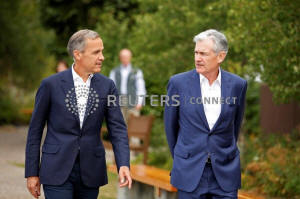Fed's commitment to act upstaged by Trump's furor
 Send a link to a friend
Send a link to a friend
 [August 24, 2019] By
Howard Schneider, Ann Saphir and Trevor Hunnicutt [August 24, 2019] By
Howard Schneider, Ann Saphir and Trevor Hunnicutt
JACKSON HOLE, Wyo. (Reuters) - Federal
Reserve Chair Jerome Powell said the central bank would "act as
appropriate" to keep the U.S. economy healthy in a deteriorating global
economy, but stopped short of committing to rapid-fire rate cuts and
drew fire from President Donald Trump.
Powell had barely completed a key Friday morning speech when Trump
ratcheted up his war of words against both the Fed chair he appointed,
and with China, which earlier on Friday had retaliated to U.S. tariffs
with its own import taxes on American crude oil, agricultural products
and small aircraft.
The rapid escalation, which tanked stock markets and drove bond yields
lower even before Trump raised the ante with additional tariffs on
China, could force the Fed to cut rates to keep the 10-year expansion
under way.
Indeed, data reported as Powell was speaking on Friday showed further
deterioration in the U.S. housing market, on the heels of figures
earlier in the week showing weakness in the manufacturing sector.

But the message from both Powell and his second in command, vice chair
Richard Clarida, was that while the Fed may be willing to cut to protect
the recovery, it made no promises.
"We take our policy decisions one meeting at a time," Clarida said late
Friday afternoon, after Wall Street trading had closed with key indexes
down from 2% to 3%.
The Fed cut rates for the first time in more than a decade last month,
backing Powell's verbal commitment to sustain the expansion with action.
Powell on Friday made clear that commitment is still in place in a
speech he gave at an annual Fed retreat at a Jackson Hole valley resort
set against the Grand Teton mountains.
He said there are "significant" risks to the economy, including the
trade dispute, the chaotic British exit from the European Union, tension
in Hong Kong and signs of a global economic slowdown.
But he also said the domestic U.S. economy is in a "favorable place" now
and he stressed limits to the Fed's ability to respond to the trade
issues. He also said officials need to "look through" short-term
turbulence, and stopped short of endorsing or signaling the pace and
depth of rate cuts markets widely expect and that Trump has demanded.
There are "no recent precedents to guide any policy response to the
current situation," Powell said, adding that monetary policy "cannot
provide a settled rulebook for international trade."
The U.S. president fumed about the Fed doing "NOTHING" in a series of
tweets and asked who is "our bigger enemy" between Powell and China's
President Xi Jinping. Markets swung when he added that "our great
American companies are hereby ordered to immediately start looking for
an alternative to China."

Global stock markets fell, with the U.S. S&P 500 index closing down more
than 2%. U.S. benchmark Treasury yields fell to their lowest level in a
week and the dollar declined broadly.
Later on Friday Trump announced he was raising tariff rates on a range
of Chinese goods by an additional five percentage points.
Fed officials say tariffs and trade tension are causing businesses to
put off spending.
"It's pretty clear to me that Powell was sending a message that if you
are so concerned about the economy, lowering rates is not going to help
you," said Craig Bishop, lead strategist of the fixed income group at
RBC Wealth Management. "You need to do something about trade. That's not
a message Trump gets."
[to top of second column] |

Federal Reserve Chair Jerome Powell and Governor of the Bank of
England, Mark Carney, are seen during the three-day "Challenges for
Monetary Policy" conference in Jackson Hole, Wyoming, U.S., August
23, 2019. REUTERS/Jonathan Crosby

DIVIDED FED, ANGRY TRUMP, A NERVOUS WORLD
The trade war has left world central bankers here on edge as they also try to
navigate a global slowdown many attribute to Trump's trade tactics, which they
worry may have lasting repercussions.
"Without question the euphemism of 'trade tensions' does not do justice to the
scale of the impact of recent trade actions, actual and potential, and to some
extent the fundamental challenge to the nature of the trading system," Bank of
England Governor Mark Carney said during a luncheon speech here.
Renewed U.S.-China trade tensions and pressure from the White House complicate
the Fed's job going into its Sept. 17-18 rate-setting meeting. Policymakers were
already divided over whether to head off economic fears with significant further
rate cuts or to stand pat because people are still finding jobs, taking home
fatter paychecks and spending money.
No matter what course Powell chooses, it is clear from the minutes of the Fed's
most recent meeting released Wednesday and from the range of comments from
policymakers also in attendance here that the chair lacks a broad consensus
among his colleagues about the appropriate course of action.
Earlier on Friday, St. Louis Federal Reserve Bank President James Bullard told
Bloomberg TV the policy-setting Federal Open Market Committee would have a
"robust debate" about cutting U.S. interest rates by a half percentage point at
its next policy meeting in September.
Bullard, who has long advocated for lower rates to counteract tame inflation,
said he is troubled by signs of a slowdown coming from the bond market. He is
referring to the relative decline in long-term bond yields, called an
"inversion" of the Treasury yield curve, that has preceded recessions.

He said he is "not interested" in testing the theory "that this time is
different" with regard to interpreting the bond market's signal.
Meanwhile, Cleveland Federal Reserve President Loretta Mester, who did not
support the Fed's rate cut last month, said she is not yet convinced of the need
to cut rates further.
"At this point, if the economy continues where it is, I would probably say we
should keep things the way they are," Mester told CNBC. "But, I am very attuned
to the downside risks to this economy."
The Bullard-Mester divide is emblematic of the wide range of opinion inside the
Fed's rate-setting committee, which voted 8-2 to cut rates on July 31 for the
first time in a decade. That tally did not fully capture the disapproval of the
move by those without a vote at the meeting, including Mester.
And, of course, there is Trump. He has been unrelenting in his demands that the
Fed cut rates, in part to help take some of the wind out of a strong U.S. dollar
that he sees hurting U.S. exports.
(Additional reporting by Richard Leong in New York; Writing by Dan Burns;
Editing by Andrea Ricci)
[© 2019 Thomson Reuters. All rights
reserved.] Copyright 2019 Reuters. All rights reserved. This material may not be published,
broadcast, rewritten or redistributed.
Thompson Reuters is solely responsible for this content.
 |